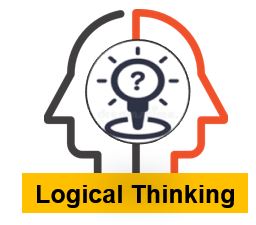Overview
Why Learn:
- Logical thinking is a fundamental skill for making informed decisions.
- It helps in overcoming biases and making more objective judgments.
- Logical reasoning is highly valued in academic, professional, and personal settings.
- Developing logical thinking skills improves overall cognitive abilities.
- Mastering logical thinking enables effective problem-solving and critical evaluation
Application and Importance:
- Enhance decision-making skills in personal and professional life.
- Improve problem-solving capabilities for academic and career success.
- Strengthen logical reasoning abilities to overcome cognitive biases.
- Develop a structured approach to analyze complex situations.
- Promote rational and evidence-based thinking in decision-making processes
Tools of Approach they will Learn:
- Logical frameworks and reasoning models.
- Analytical thinking strategies.
- Critical evaluation techniques.
- Problem-solving methodologies.
- Application of logic in various domains and scenarios.
Course Content
Fill out the registration form with your personal information, including your name, contact details, and any relevant background or experience.
Confirm your registration and proceed to the payment section.
Please note:
Registration is on a first-come, first-served basis, and spots are limited.
The course fee covers all training materials, instructor fees, and access to the online learning platform.
The training venue cost is not included in the course fee and will be charged separately.
The course requires a minimum of 15 participants to start. If the minimum requirement is not met, you will be notified and provided with alternative options.
If you have any questions or need assistance with the registration process, please contact our customer support at [contact details].
Learning Outcome
Critical Thinking Skills:
- Developing analytical and evaluative thinking abilities
- Enhancing problem-solving and decision-making skills
Deductive and Inductive Reasoning:
- Differentiating between deductive and inductive reasoning
- Applying logical reasoning patterns to draw valid conclusions
Logical Fallacies:
- Identifying common logical fallacies and their impact on reasoning
- Avoiding pitfalls and biases in logical thinking
Analyzing Arguments:
- Evaluating the strength and validity of arguments
- Applying logical frameworks to assess evidence and claims
Problem-Solving Techniques:
- Applying logical thinking to solve complex problems
- Utilizing logical frameworks for effective decision-making
Lesson Objectives:
- Develop critical thinking skills to enhance problem-solving abilities.
- Apply deductive and inductive reasoning to analyze and evaluate information.
- Recognize and avoid common logical fallacies in everyday reasoning.
- Evaluate the strength and validity of arguments.
- Apply logical thinking techniques to solve complex problems effectively.
Who Will Benefit:
- Students seeking to improve their critical thinking and problem-solving skills.
- Professionals looking to enhance their decision-making abilities.
- Individuals who want to develop a logical mindset for better reasoning.
- Anyone interested in understanding the principles of logic and their practical applications.

